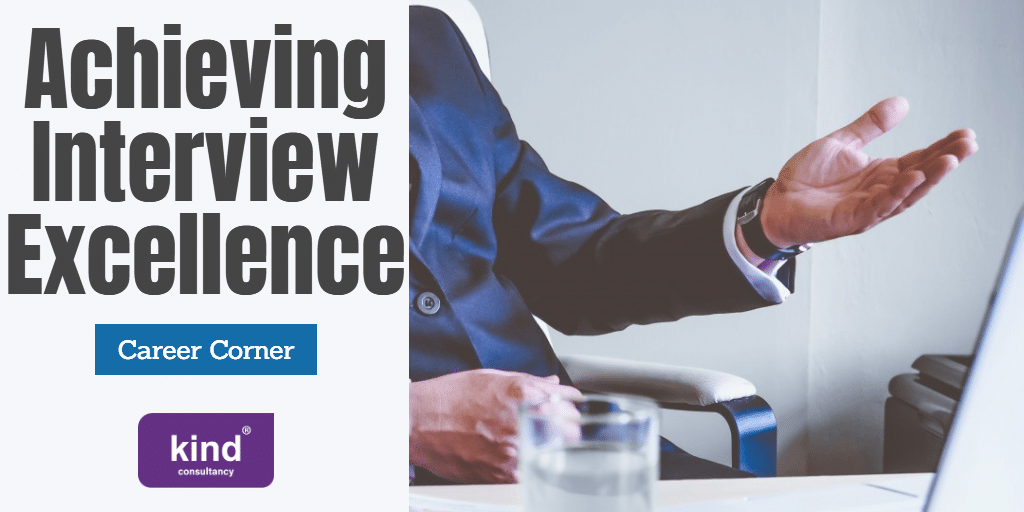Career Corner: Achieving Interview Excellence
Being the right candidate for a job is about a number of factors. You need to have the right experience, built up across a career in relevant positions. You need to have developed the skills, honing your abilities and expanding your knowledge. You can have the perfect CV (read our guide on building a better CV right here) but you also need to demonstrate a crucial skill which is helpful for any job you’re applying for: interviewing well. How can you make sure you stand out from other applicants?
It starts with the preparation. Do your research. First, on the company. Don’t just glance over the basic facts, dig deep, learn everything you can online about the history of the company, their current market position, their subsidiaries or their parent company. Social media has opened up new paths here for job seekers – you can have a look at what kind of interactions the business has on their LinkedIn, Twitter and/or Facebook accounts to get a sense of their culture before you even walk into the office. You won’t necessarily need to reference all or even very much of this in the interview, but it can inform your approach and what questions you ask of the interviewer. A really good interview should feel more like a free-flowing conversation, and thorough preparation can separate you from candidates who ask stilted, obvious questions. Second, ridiculous as it may sound, research yourself. Make sure you are thoroughly familiar with everything you mention on your CV, so you’re ready to discuss any aspect of it in further detail without having to look back at the document. If the interviewer has asked for your Linkedin, again, read closely over the information you’ve put on your profile before you head into the meeting – and have a quick read of our guide to managing your social media presence during your job search.
Next, consider punctuality and timing. Obviously not being late is critical, but there are other factors to take into account here. We always recommend that when possible candidates do a practice journey to the interview location ahead of the actual date so they have a good idea of how long it will take them to get there in real-world terms. Travel at a time that allows plenty of room for error – late and cancelled trains can throw off your arrival by a significant margin. Aim to arrive 10-15 minutes before your interview time; any earlier and you may seem disorganised or as if you’ve taken down the interview details wrong.
Once you’re in the interview, try to maintain a conversational rhythm while maintaining a confident, professional demeanour. Make sure you’ve got STAR examples rehearsed and ready to go – almost all interviews for Governance, Risk and Compliance roles at the moment will involve at least some competency-based questions. These are questions in the style of “Describe a time when you led or worked in a team”, “Tell me about a time where you made a difficult decision” or “Give an example of an example of a time you’ve solved a problem at work”. If you’re not prepared, the open-ended nature of these questions can leave you fumbling for minutes as you try to recall and structure a relevant memory, so, be ready. Look up examples of popular competency-based questions ahead of the interview and come up with STAR answers for them – Situation, Task, Action, Result. Most popular competency-based questions are variations on just a few themes; leadership, teamwork, problem-solving and time management, so we recommend preparing answers on all of those potential topics.
Remember that the interview may be your only chance to impress your potential new employer face to face – if you feel that you haven’t demonstrated all of your relevant qualities as your time draws to a close, don’t be afraid to ask if they have any reservations about you as a candidate. This shows confidence and will allow you to directly address any perceived gaps in your CV.
Finally, end on the right note. Re-state that you’re really interested in the position, that you would love the opportunity to join this company, that you’re looking forward to working together. Keep it warm and specific – let them know that, based on what you’ve learned in the interview, you are surer than ever that this is a good fit for you. Make sure to ask about what happens next in the recruitment process, but be tactful about how you phrase it -“What’s the next stage of the process?” shows you’re serious but “When will I find out if I’ve got it?” makes you sound entitled and aggressive.
Interviews can be nerve-wracking but remember that it should always be a two-way conversation about establishing if you are the right candidate for the job and if the job is right for you. If you feel like you’re being interrogated and facing a series of frosty silences when you try to open up the discussion, chances are that company culture isn’t going to be a good fit for you. Interviewing well is a skill just like any other and it takes practice to improve it, so treat every interview as an opportunity to work on your abilities.
If it hasn’t gone to plan, read our tips on bouncing back from interview rejection.




